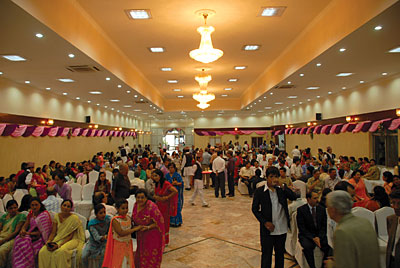 DINESH MAHARJAN |
I'm hardly alone in heaving a sigh of relief that in inverse proportion to the much-anticipated monsoon, wedding invites have ceased to flow. To a lesser or greater degree for everyone with a social circle, but especially those firmly ensconced in Valley society, the last few weeks have been clogged with the obligations of engagements, ceremonies, and receptions. In recent years, weddings have morphed into many-headed monsters, as have bratabandhas and pasnis, meaning a single event that would have taken place in the confines of the family home now sprawls out into party palaces and five-star hotels, depending on the balance between your name and your game.
Add to these gala occasions, events and the more mundane meets with family and friends, as well as professional obligations, and it's easy to feel overwhelmed by the demands on your time. It's gratifying to be wanted (if not actually needed), but the oft-denigrated atomisation of certain western existences sometimes has its own charm in so much as you have more say over picking your engagements, not they you.
Assuming that apart from me, there are others who feel the press of humanity is a little too tight round these here parts, why do we do this to ourselves? It may appear to be a natural consequence of simply knowing people. Knowing me knowing you, is there simply nothing we can do but attend so as not to offend? Can we not strike a balance so an individual attends the events he actually wants to, for whatever reason?
Of course, we find a balance somewhere along the line. But sometimes it does seem as if we have entrapped ourselves into a benevolent spiral of socialising, whereby we invite people we barely know simply because they will do the same because we will do the same because. The downside is the time we expend, and the amount of moolah lavished on social overkill, wherein a pasni is now regularly accompanied by a party for hundreds, never mind the poor bewildered babe-in-arms who has no idea what is going on.
Social capital may be defined in many ways. Perceived positively, it is the value derived from the power of social networks, value that can be used to achieve what mere individuals cannot. But it can also be construed negatively, in the sense that 'bonding' social capital serves to disproportionately strengthen the links among individuals linked by radical ideals, or individuals marginalised from society.
It's clear that many marginalised groups across Nepal have taken the initial, necessary step of building 'bonding' social capital so as to find their voice. But by limiting themselves there, some of these groups isolate themselves further from the mainstream polity they are trying to break into. 'Bridging' social capital, on the other hand, reaches across such boundaries. It's more difficult to achieve, but its effects are more positive for society as a whole.
In the Valley, however, the bonding that goes on is hardly an expression of marginalisation in the conventional sense. Quite the contrary. It's a celebration of socialisation within set circles that, alas, has come to burden our financial and temporal resources, and only reinforces our magnificent, privileged isolation from the rest of the country.
This is not to argue for some kind of jackbooted state quota on how many can attend this and that, as has been unsuccessfully attempted in the past. People have the right to assembly in as vastly wasteful numbers as they desire, even if government has the right to advise otherwise. But perhaps we should reflect on whether we are making the best use of our social capital when we find ourselves greeting last night's weary faces at Party #3 of Shirish Weds Anjali with a resigned, "So, are you coming tomorrow?"
READ ALSO:
Muddy waters, PRASHANT JHA
Multitracking South Asia, PUBLISHER'S NOTE
Ignored economy, ARTHA BEED
I Love Prachanda, RANJAN ADIGA



